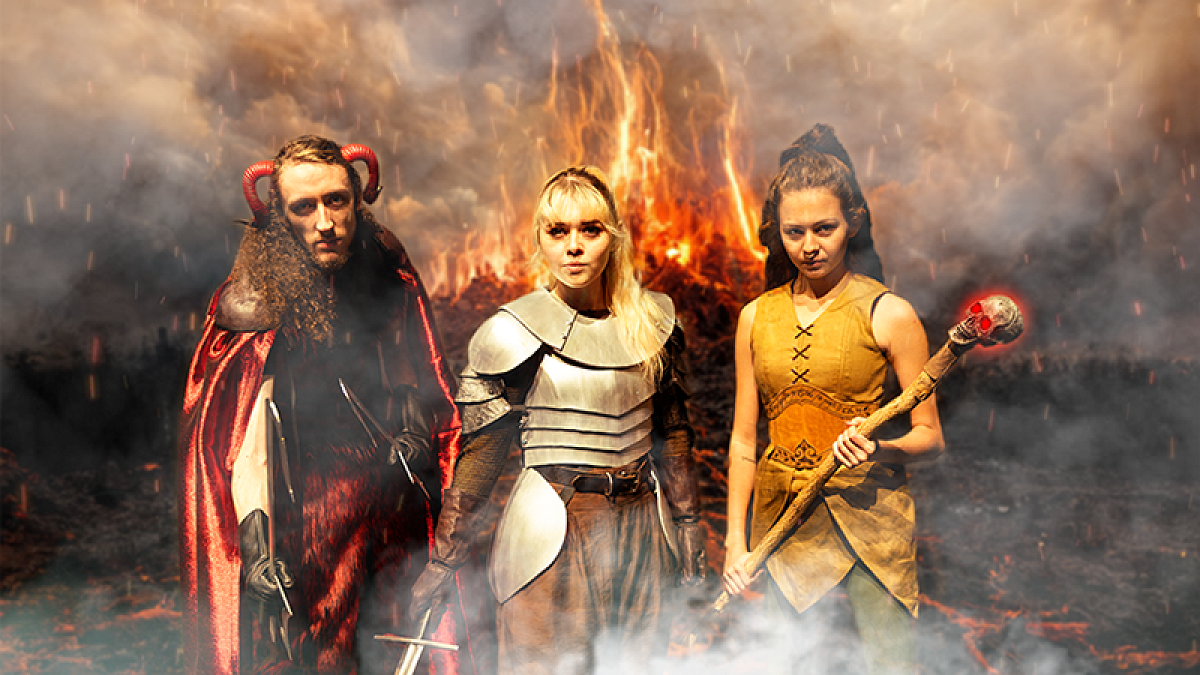Before “Stranger Things,” there was “She Kills Monsters,” a 2011 coming-of-age drama-comedy brimming with Mind Flayers and Bulettes, also known as landsharks, and an array of other monsters and heroes drawn from the popular role-play game Dungeons & Dragons.
Celebrating its 10-year anniversary, the popular Qui Nguyen play, staged nearly 800 times in high school and college theater departments around the country, opens University Theatre’s 2022-23 season on Nov. 4 at the Robinson Theatre.
Shows will be Nov. 4, 5, 11, 12, 18 and 19 at 7:30 p.m. and Nov. 13 at 2 p.m.
The play follows a young woman who, after losing her family in a car crash, discovers a module her younger sister had written for the Dungeons & Dragons game. With the aid of a Dungeon Master, fantasy and reality collide as she immerses herself in the game and discovers how little she knew about her sibling.
Through the magic of theater, the game not only comes to life onstage, but also provides ample opportunities for the cast and crew’s creativity to run wild.
The initial plan was to use only puppets, but associate professor and costume designer Jeanette DeJong suggested blending actors and puppets with the use of costumes.
“We’ll be using a variety of puppets and actors in large costumes and puppet appendages,” said Department of Theatre Arts associate professor and play director Michael Malek Najjar. “It’ll be a mixture of costume and puppetry, and that hybridity is what’s going to make it extremely exciting and help the audience take that leap into virtual reality and Dungeons & Dragons.
The play also will feature a Tiamat dragon, “a large, elaborate puppet that all of the puppeteers who are playing the other characters and monsters will manipulate.”
Because battling monsters can get quite physical, Najjar is enlisting the expertise of local actor and choreographer Bill Hulings to help the actors navigate the multiple fight scenes. Also volunteering their time and choreographic skills are four UO cheerleaders, headed by Morgan Nguyen, for a cheer-off in the play which pits the heroine against a couple of evil cheerleader succubae in a “Bring It On”-style call and response segment.
On opening night, patrons are encouraged to join in the D&D fun and come dressed in their favorite cosplay outfits.
Although monsters play a dominant role, the play also addresses deeper issues relating to bullying, identity, disability and the ordeal that high school can be.
“In the real world there are high school students who are just trying to make it through all the crummy things high schoolers have to face — the discrimination, the taunting, the bullying, homophobia, the physical limitations that some of them have,” Najjar said.
The challenge, he said, is how to make both worlds viable.
“It asks a designer to not only think about D&D as a genre,” Najjar said, “but to also think about if one was living in the real world and had a D&D avatar, what would be the connection be between their real-world self and their D&D character?”
For instance, one character in the play has cerebral palsy and uses crutches in the real world, but in the world of Dungeons & Dragons she becomes a fierce elf fighter.
“The solution,” he said, “was to have the elf staff she uses come apart and separate into two different staffs which transmute back into the crutches.”
As the main character immerses herself in the game, she learns that her sister, who was gay, had created a world where that was not an issue, where people were accepted for who they were, and by creating an avatar “self” she and her friends could be the people they couldn’t be in the real world.
“The monsters are fun,’ said Najjar, “but the message of the play clearly is to ask ourselves if we are as open-minded and tolerant as we think we are, and ultimately, can we create a real world that is more inclusive?”
Advance tickets are available online, by phone at 541-346-4363 and at the Erb Memorial Union ticket office, or one hour prior to the show in the Miller Theatre Complex lobby. Tickets are free for UO students, $10 for adults, and $8 for UO faculty and staff members, seniors 65 and older, youths in grades K-12, and non-UO college students.
—By Sharleen Nelson, University Communications


